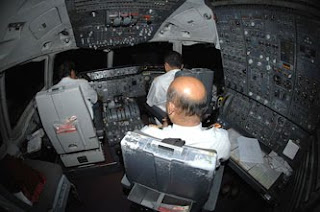DC-10 Three Man Crew
@ 2008 SamChuiPhotos.com and Sam Chui Photography
I have been a long time supporter of three man cockpit crews. Three is the ideal number for a lot of really good reasons. I like to verify my opinions based upon personal experiences. @ 2008 SamChuiPhotos.com and Sam Chui Photography
Consider the case where you are going to have a lunch with a good friend you have not seen in the past year. Even though you have a lot of things and experiences in common, sometime during the lunch a period of time of not saying anything happens. When I have lunch with three people that never happens and there are times when all three of us are talking at the same time.
In other words, the social side as well as the intellectual side of the experience is a much richer one. I believe this point was ignored when the decision to permit just two pilots operate aircraft carrying passengers was made. I would suggest taking advantage of this phenomena when determining the size of the crew.
Another factor not talked or written about to my knowledge is a weakness in the two man crew concept. This factor is the relative strengths of the personalities of the two pilots. If you have one very strong personality, it is most likely he will dominate the operation. This is much less likely to happen in a three man crew in that the two other crew member can better balance and offset the domination.
The cost of the third crew member has been the driving factor to remove him. Consider the additional cost per passenger of the third member and the greater the number of passengers carried, the lower the cost. In the case of the larger aircraft such as the A-380 with 560 passenger capacity, it is a really small number. Too small when you consider the advantages of having him on board.
Ever since the decision to permit the size of crew to be reduced to two, the National Transportation Safety Board (NTSB) in all the accident investigations it conducts, never mentions the positive impact a third crew member could have on the outcome or prevention of the accident. It is a taboo subject in the world of aviation safety today. No one even talks about it. Why is it not mentioned or talked about today?

nike trainers
ReplyDeletecheap nike shoes
ralph lauren outlet
moncler online
polo ralph lauren
bottega verde sito ufficiale
christian louboutin shoes
michael kors outlet
air jordan
adidas yeezy
off white
ReplyDeletegap yeezy
chrome hearts outlet
jordan shoes
goyard outlet
bape outlet
supreme t shirt
bape shoes
ggdb sneakers
bape